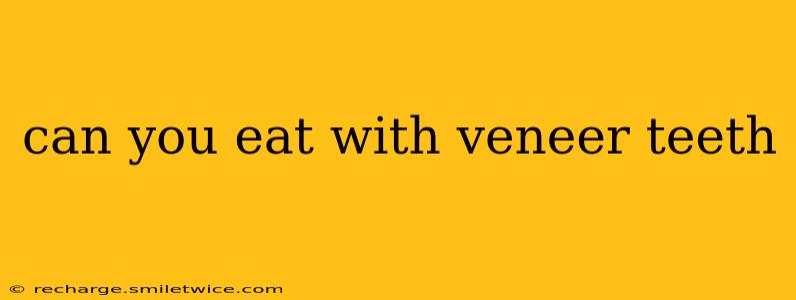Can You Eat With Veneer Teeth? A Comprehensive Guide
Yes, you absolutely can eat with veneer teeth! However, it's not quite as simple as "eat whatever you want." While porcelain veneers are incredibly strong and durable, they're not indestructible. Understanding how to care for your veneers and what foods to avoid will ensure their longevity and maintain your beautiful smile.
This guide answers common questions surrounding eating with veneers, providing you with the knowledge to enjoy your favorite foods while protecting your investment.
What Can I Eat With Veneers?
Generally speaking, you can eat most foods with veneers. They're designed to withstand the normal stresses of chewing. This includes:
- Soft foods: Think yogurt, mashed potatoes, applesauce – these pose minimal risk to your veneers.
- Most vegetables: Steamed or cooked vegetables are generally fine. However, be mindful of exceptionally hard or crunchy vegetables (discussed below).
- Meats: Well-cooked meats present no major challenges.
- Bread: Most breads are okay, but avoid extremely hard crusts.
What Foods Should I Avoid With Veneers?
While veneers are durable, some foods are best avoided to minimize the risk of chipping or damage:
- Extremely hard foods: Things like hard candies, ice, nuts (especially walnuts and pecans), and popcorn kernels can easily chip or crack your veneers. These should be avoided entirely.
- Sticky foods: Caramels, taffy, and other sticky candies can pull on your veneers, potentially causing them to loosen or break. Enjoy these treats sparingly and in moderation.
- Foods requiring excessive chewing: Tough, chewy meats like jerky or very fibrous vegetables require more forceful chewing, increasing the risk of damage.
- Biting into hard objects: Avoid using your teeth to open packages or bite into anything exceptionally hard.
Will Veneers Affect My Bite or Chewing Ability?
High-quality veneers are expertly crafted to fit your mouth perfectly, so they shouldn't significantly affect your bite or chewing ability. However, in the initial days after placement, you might experience a slight adjustment period. This is perfectly normal and usually resolves quickly. If you experience persistent discomfort, contact your dentist.
Can Veneers Break or Chip?
While strong, veneers can chip or break under excessive force. This is why it's crucial to avoid the hard and sticky foods mentioned above. Good oral hygiene practices also significantly reduce the risk of damage.
How Can I Protect My Veneers While Eating?
- Cut your food into smaller pieces: This reduces the force needed to chew.
- Chew carefully and slowly: Avoid aggressive chewing.
- Practice good oral hygiene: This helps prevent gum disease, which can affect the longevity of your veneers.
Do I Need to Change My Diet After Getting Veneers?
You don't need to drastically change your diet, but adopting a few mindful eating habits will help protect your investment and keep your smile looking its best for years to come.
What Happens if My Veneer Chips or Breaks?
If your veneer chips or breaks, contact your dentist immediately. They can assess the damage and advise on the best course of action, which might involve repair or replacement.
By following these guidelines and practicing mindful eating, you can enjoy a wide variety of foods while preserving the beauty and longevity of your porcelain veneers. Remember, maintaining regular dental check-ups is crucial for the long-term health of your veneers and overall oral health.
